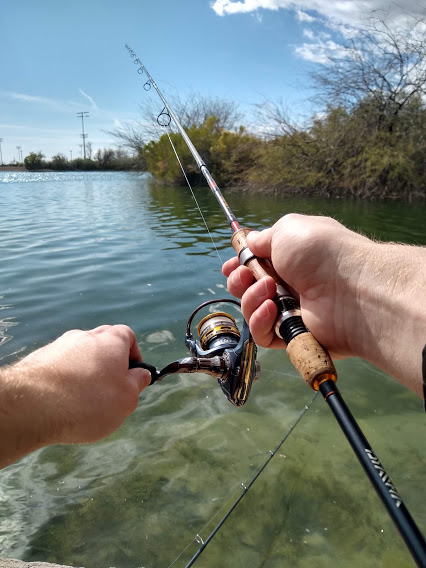Are you hooking fish only to have them shake off the hook before you get them to the net? This happens to even the best anglers. However, if it is happening too often, then you may be doing something wrong that we want to fix.
Fish usually get off the hook because the angler is allowing inconsistent tension on the fishing line. It is important as an angler to develop the techniques of fighting a fish. It’s also important to make sure you are using the correct gear.
Develop Skills to Keep Fish From Getting Off Your Hook
There is a decent amount of skill and technique that goes into fighting a fish. But don’t worry, you can learn it pretty quickly. There are a few points to understand to keep the hook in the fish.
Keep Proper Tension
The number one key to fighting fish is using the proper tension. Letting your line get too tight or too lose can be a reason why fish keep getting off your hook.
The worst thing you can do while fighting a fish, is to let there be any slack in your line. When a fish gets hooked they will be doing whatever they can to shake it out of their mouth. By holding the line tight, you are locking the hook in the fish’s mouth.
However, too much tension is also a bad thing. Some fish have soft mouths that can tear if you pull too hard. Sometimes your hook is just barely hanging on and can easily be pulled out.
One way to help maintain proper tension on the fish is to set the drag on your reel.
Drag Settings
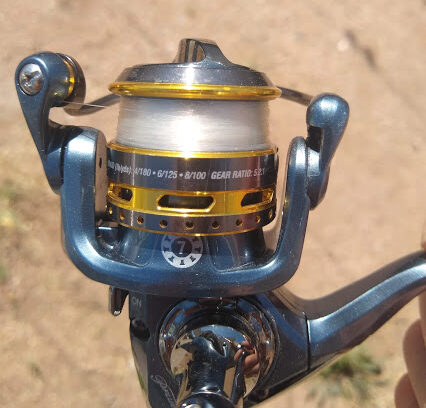
All modern fishing reels come with a built in drag system. This is a mechanism that will allow line to be pulled off the spool when there is too much tension. It’s main purpose is to prevent a fish from breaking your line when they make a run.
You can adjust your drag to match your fishing line strength. You want it loose enough that your line won’t break when you pull on it, yet tight enough that the fish isn’t constantly pulling out line.
Rod Angle
Another way that fish get off the hook is by jumping and shaking their head. Though it may be fun to see a fish jump, it’s the most likely way a fish can shake a hook.
By holding your rod tip up high, you are pulling the fish towards the surface and encouraging it to jump. So instead of keeping your rod tip high, it’s usually better to point it sideways.
Side Pressure
You can point your rod tip left or right to pull the fish in the direction you want them to go. For example, if the fish is swimming towards a snag, you can pull it the other way.
Upwards Pressure
The time you do want to point your rod tip up, is if you are trying to get the fish off the bottom. For example, there maybe a lot of snags or sharp rocks on the bottom and you need to pull the fish up and out.
This is also helpful if you are fishing in thick weeds and it’s better to drag the fish along the surface rather than let it get tangled up in the vegetation.
What To Do If A Fish Jumps?
If a fish jumps while you are reeling it in, quickly point your rod tip down and to the side. Try to get your rod tip right down near the surface of the water. This will keep tension on the hook, and discourage the fish from jumping again.
Use The Rod
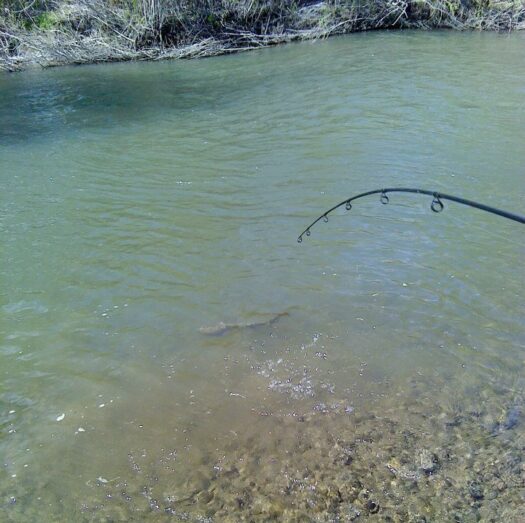
As we all know, fishing rods bend. This bending and springiness is what helps us to cast our baits and lures. It is also there to help keep the hook in the fish’s mouth by absorbing the shock of a headshake, and holding tension on the line.
As you are reeling in a fish, try to keep the fishing rod bent at all times. The worst thing you can do is point the rod directly at the fish while you reel.
This puts all the weight of the fish on your line and drag system. If a fish suddenly swims towards you, you may not be able to reel fast enough to keep the line tight. And once the fish has some slack they can shake the hook out.
Reel Speed
Another reason why fish keep getting off your hook may be that you are not reeling properly.
It’s easy to get over excited and start reeling like a mad man to get the fish in as quick as possible. However, you are more likely to lose fish this way.
When we are more focused on reeling and forget about using the rod, we create uneven pressure which can give the fish opportunities to shake out the hook.
鱼战斗的关键是保持smo的一切oth. When the fish lets off some pressure, reel. When the fish makes a run for it, stop reeling and let it pull off some drag. Think of it like a game of tug-o-war.
Utilize The Proper Gear To Keep Fish on The Hook
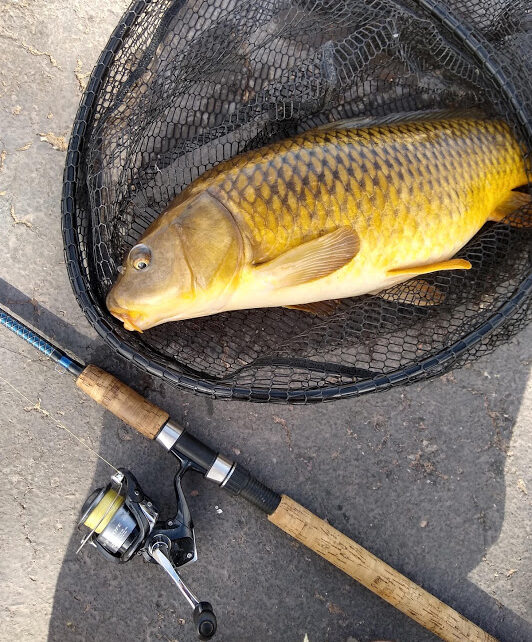
Rod
I talked about rods and their springiness. Some fishing rods are stiffer than others and you should match the rod to the type of fish you are targeting.
The bigger the fish, the stiffer the rod can be.If you try to catch a little trout on a big catfish rod, the rod will not bend during the fight, and the little trout will easily be able to get off the hook.
On the other hand, if you catch a big catfish on a little rod, you may break your rod or just not have enough power to pull the fish in.
When fishing for bass, you generally want a stiff rod to pull the bass out of thick cover. Bass like to hangout near weeds and brush, and if you don’t have a powerful rod to control them, they can quickly get your line wrapped around something and break off.
Reel
Your reel isn’t as important as your rod when it comes to fighting a fish. However, you still want to make sure you have a decent drag.
Some reels get old and dirty and the drag will lock up, or just not be smooth. It’s important to have a smooth drag so your line doesn’t break when the fish makes a run.
And if you are catching fish with soft mouths like crappie or kokanee, a stuck drag can pull the hook right out of the fish’s mouth.
Line
Your fishing line can also have a lot to do with keeping the hook in the fish’s mouth.
Different fishing lines have different levels of stretchiness. Monofilament is a very popular type of fishing line, and has the most stretch. This can help to keep tension on the hook so the fish can’t get off.
Fluorocarbon is another popular fishing line that is slightly less stretchy.
Braid is the third type of fishing line and has no stretch to it at all.
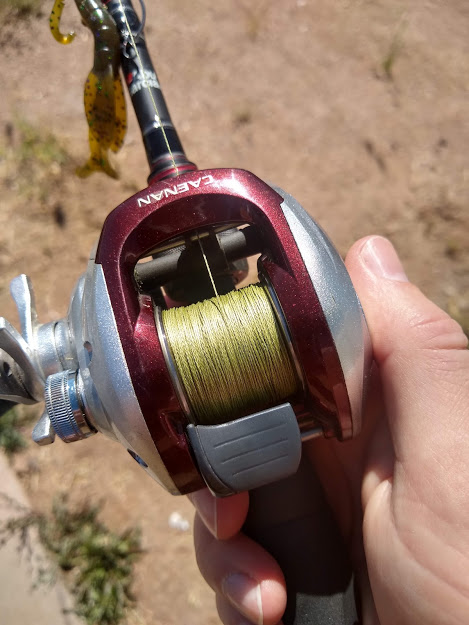
We already talked about the pro of having a stretchy line, but there are also times that no stretch is a good thing. For example when bass fishing, braided line gives you a lot more control over the fish to keep it out of the snags.
With a stretchy line, you can maintain a more constant pressure, but you give up some control to steer the fish.
So use braid if you need control to keep the fish out of snags. But use mono or fluoro if you are fishing open water.
If you want to learn what fishing line you should use, check out my page onhow to choose the right fishing line.
Hooks
One reason your fish keep getting off the hook could be because you are using the wrong type of hooks.
你应该用一个钩子和良好的穿刺能力。This means sharp and thin.
Micro Barbs
微刺是最好的在养鱼ok. Some hooks come with really big barbs, but the problem is that it can be difficult to pull that barb through on the hook set. A micro barb is low profile enough to have good puncture ability, while still being big enough to hold the hook in.
Hook Shape
There are many different hook shapes on the market. One common hook type that isn’t as good as it looks is the treble hook. This is three hooks stuck together into one. They are usually found on lures.
Trebles do work well in some situations, but with smaller fish like trout, it’s better to use a single hook. Again this has to do with getting a good hook set. It’s easier to set one hook in a fish’s mouth than it is to set multiple.
The problem with not getting good hook penetration is that if the hook doesn’t go in past the barb, then it can be pretty easy for the fish to get off the hook.
Two of the best quality hook brands you can look at are Gamakatsu and Owner.
Conclusion
It’s frustrating when fish keep getting off the hook, but with the right tips and a little practice, you should be able to greatly increase your landing ratio.
Remember,
- Fight with the rod, not the reel.
- Use the proper sized rod and line.
- Use good quality, sharp hooks.
FAQ
Depending on the severity, fish can heal from hook wounds within 1 to 3 weeks.
Biologists have determined that fish do have nervous systems and can feel pain. If you are going to catch and release, try to handle the fish with care. They will experience more painful things in their life than a hook.
Many tests have been performed to see how long it takes for a hook to rust out of a fish’s mouth. Most results say 2 to 3 months. However, this depends on the size of the hook and if it’s in salt or fresh water. You can do your own test with your favorite hook and a glass of water.
A fish won’t usually die from swallowing a hook as long as the line is cut close and the fish is released quickly. Spending too much time trying to get a hook out is more likely to kill it. Fish swallow spiny bluegill all the time and they are fine.
